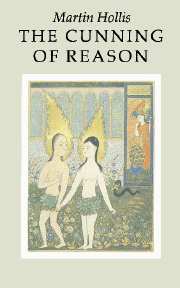Book contents
- Frontmatter
- Contents
- Preface
- 1 The sovereign artificer
- 2 Rational choice
- 3 Norms and institutions
- 4 The Cunning of Reason I: unintended consequences
- 5 Motivation
- 6 External and internal reasons
- 7 Rational Expectations
- 8 Maximising and satisficing
- 9 The Cunning of Reason II: functions and rules
- 10 Reasons and roles
- 11 Rationality and understanding
- 12 The Cunning of Reason III: self and society
- Bibliography
- Index
3 - Norms and institutions
Published online by Cambridge University Press: 15 December 2009
- Frontmatter
- Contents
- Preface
- 1 The sovereign artificer
- 2 Rational choice
- 3 Norms and institutions
- 4 The Cunning of Reason I: unintended consequences
- 5 Motivation
- 6 External and internal reasons
- 7 Rational Expectations
- 8 Maximising and satisficing
- 9 The Cunning of Reason II: functions and rules
- 10 Reasons and roles
- 11 Rationality and understanding
- 12 The Cunning of Reason III: self and society
- Bibliography
- Index
Summary
Adam, being a rational economic agent, never underplays his hand. The logic of the model commits him to rejecting inferior options. Eve is another. The question of this chapter is how far they and their descendants can get in forming an organised communal life, if any joint activity is to be viewed as interaction among bargain–hunters. If they turn out to need help from God, that will mark a limit to the ambitions of the theory of rational choice. But it is not obvious in advance that they will need any help at all. Analysis offers a route for constructing the complex out of the simple. Action is the expression of individual preference and calculation; interaction the sum of actions; institutions an outcome of interactions. Or so many thinkers have claimed and, at worst, the thought provides a ready way to organise discussion.
Eve's arrival is the cue for the theory of games. As with microeconomic theory, the analysis of games can soon turn very technical and sophisticated. But here too there are some utterly basic moves, which are enough to get the theory moving and to excite philosophical curiosity, even without plugging in the various technical systems needed for advanced purposes. Let us start with the idea of a ‘game’.
A ‘game’ in the theory of games is not what we ordinarily mean by the term, and needs a formal definition. There are Wittgensteinian reasons for doubting whether we in fact ordinarily mean anything definite or univocal. But I shall risk picking out one recurrent strand of family resemblance among everyday games, since it is notably absent from the starting point of game–theory.
- Type
- Chapter
- Information
- The Cunning of Reason , pp. 29 - 46Publisher: Cambridge University PressPrint publication year: 1988



